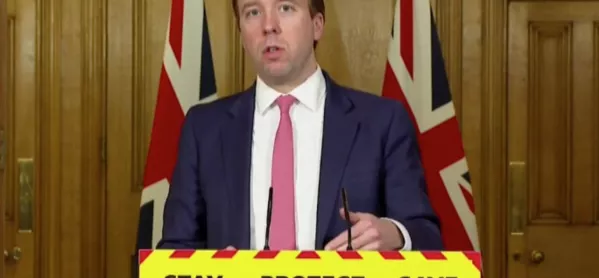Health secretary Matt Hancock has confirmed that the government intends to go ahead with the wider reopening of schools in England on 8 March as planned, despite the discovery of the Brazilian P1 variant of Covid-19.
He was asked at tonight’s Downing Street press conference whether the discovery of six cases of the new variant of the coronavirus could derail the government’s plan for unlocking the country, which starts with schools next week.
Mr Hancock said the government’s schools plan would not be affected and he was highly confident that this was the right thing to do.
Quick guide: School reopenings: what you need to know
Schools reopening: Whitty denies having doubts over 8 March schools return
Testing: Schools can begin testing before 8 March
The emergence of new variants of concern is one of the tests the government is using to decide when to move out of the lockdown.
When asked if the Brazil variant could affect the reopening of schools, Mr Hancock said: “We do not think that there is any need to change the approach on schools for Monday because of this new variant.
Matt Hancock: Reopening schools ‘the right thing to do’
“And the reason we think that is because in five out of six cases, we have been in contact with them, three in Scotland and two in England in South Gloucestershire, and we have a high degree of confidence that they have followed quarantine as they were legally required to do.”
He said that in relation to the sixth individual, who the government is trying to trace, they had not seen any evidence of any community spread of the variant.
Mr Hancock and health officials were also asked about which steps out of lockdown they were most worried about.
The health secretary said: “We have set out the tests precisely that we can be sure that the data still allows for the safe step down the road map. I am highly confident that the opening of schools on Monday is the right thing to do. The data points that way.
“We will assess the data before taking step two. The road map is designed to be able to see the data before we take each step.
“We have done it that way to have the assurance that we are taking a cautious but irreversible path out of this pandemic.”
Dr Susan Hopkins, of Public Health England, said: “Children are going back to school and each point is likely to lead to interactions with others, and therefore we are likely to see an increase in the R number [the Covid reproduction rate] and potentially more transmissions.
“What we need to do is give time after each of the events to monitor the impact of that, not just on cases in the community but particularly in hospital admissions and deaths, which is what we see the vaccines are preventing.
“We will need to monitor the impact after each step, and that is going to be really important.”
